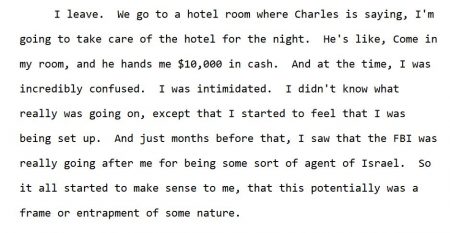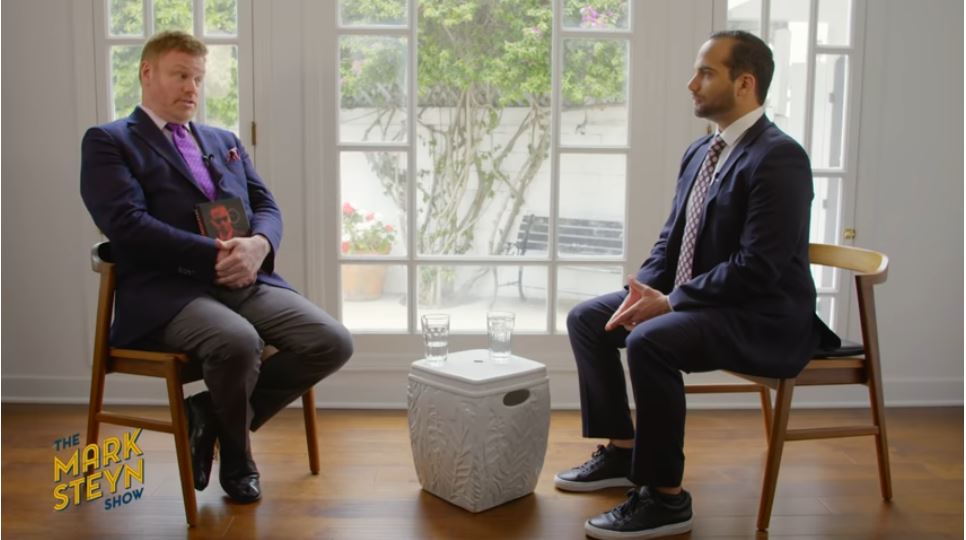“A SHADY HOTEL ROOM IN TEL AVIV”
by Sharon Rondeau

(Jun. 1, 2019) — During the second part of a face-to-face interview with radio host and commentator Mark Steyn, former Trump campaign advisor George Papadopoulos said he believes a congressional subcommittee intends to investigate the origins of a $10,000 cash payment Papadopoulos received in a Tel Aviv hotel room in 2017 by an individual named Charles Tawil.
As he wrote in his book, “Deep State Target,” Papadopoulos told Steyn he believes Tawil is a CIA asset associated with the country of South Africa.
Papadopoulos said he was given the money during a vacation to Greece, from which he took a side trip to Israel when Tawil indicated he had a business proposition to offer him there. According to the book, Papadopoulos, then 29, asked for a contract to solidify Tawil’s hiring of him as a consultant, but none was forthcoming.
Beginning in 2015, Papadopoulos lived in London and worked to establish an energy cooperative among Greece, Cyprus and Israel, an idea Papadopoulos said placed him on the Obama regime’s radar due to its support of Turkey. He originally was hired by the Ben Carson campaign, a paid position he said in his book ended when Carson terminated his White House bid.
At the 18:00 mark, Papadopoulos explained to Steyn, as he did in the book, that although he had misgivings about accepting the money, he did so “in a shady hotel room in Tel Aviv.” He said that on the following day, he delivered the cash to an attorney in Athens for safekeeping before returning to the United States.
In closed-door testimony to members of two congressional committees last fall, Papadopoulos described the same incident, stating, “I was incredibly confused. I was intimidated. I didn’t know what really was going on, except that I started to feel that I was being set up…” (p. 121).

Papadopoulos told Steyn the money was given to him in “hundreds” and that “a congressional committee wants to review” them. “There is tremendous suspicion that those bills are marked and they might actually lead to the Treasury Department…it might coincide with an operation that was run at me…I’m pretty sure this topic is going to become a lot more front-page news, probably in the next two or three months, than it is right now,” he told Steyn.
On July 27, 2017, Papadopoulos wrote in his book (Location 33 of 2942), he flew into Dulles International Airport, where he was immediately seized by two FBI agents who rifled through his belongings, indicating they were looking for cash. He was shackled at the ankles and wrists as if he were a “terrorist,” he told Steyn.
In his book, Papadopoulos wrote that in response to his questions as to why he had been arrested, one of the agents replied, “This is what happens when you work for Trump” (Location 44 of 2942).
Although he ultimately accepted a plea agreement with the Justice Department for allegedly providing false information to FBI agents during a January 2017 interview, Papadopoulos has said in a myriad of interviews over the last six months that he was the object of a conspiracy to spy on a political campaign conducted by both U.S. and overseas intelligence agencies.
Given that Special Counsel Robert Mueller’s team found no evidence to support the claim that anyone within the Trump campaign coordinated with Russia to gain an election advantage, Attorney General William Barr has said he is determined to find the “predicate” upon which the counterintelligence probe into the campaign launched by the FBI was founded.
Papadopoulos indicated that if the money was an attempt to “entrap” him “again” by “agents looking for this money” when he debarked from his flight, it would present “a whole new can of worms for the FBI.”
He claimed to Steyn that President Trump’s phone call to the “Italian Prime Minister” on April 22 was not “a coincidence” (25:53) and that he believes the Italian government is currently in negotiations with U.S. authorities to compel testimony from Joseph Mifsud, the individual who first approached Papadopoulos in Europe unsolicited in late April 2016, alleging that “the Russians” possessed “dirt” on Hillary Clinton.
In Part 1 of the interview, Papadopoulos told Steyn that he had no interest in the topic and that he never inquired about any negative information someone might have had on Trump’s political opponent. Papadopoulos agreed with Steyn’s characterization that Mifsud’s subsequent disappearance left Papadopoulos to be “the fall guy” in the Trump-Russia “collusion” narrative.
In the transcript of her December 2018 testimony to members of the House Oversight and Judiciary Committees, former Attorney General Loretta Lynch said that at some point in 2016, the name “George Papadopoulos” was raised to her in apparent connection with activity being carried out by the FBI (pp. 143-146, 182).
The transcript from Lynch’s testimony and others reveal that not only was Carter Page under some type of government surveillance, but also Papadopoulos. The names of Lt. Gen. Michael Flynn (Ret) and Paul Manafort were also mentioned to Lynch by Rep. Sheila Jackson-Lee (pp. 66-67).

